

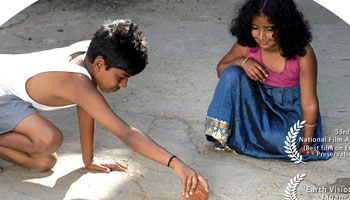
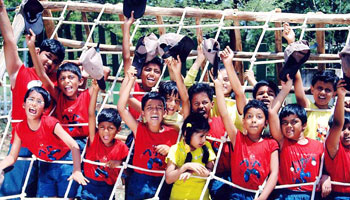
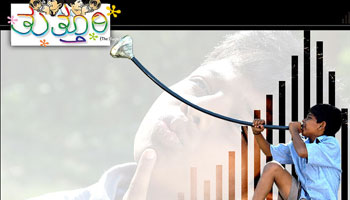
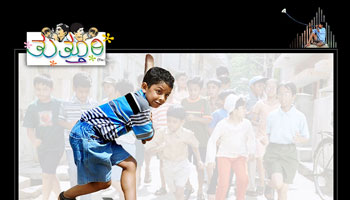
This film Thutturi (The Bugle) is an attempt to highlight this problem to raise the consciousness of society about the imperative need of nearby playground for children in each locality.
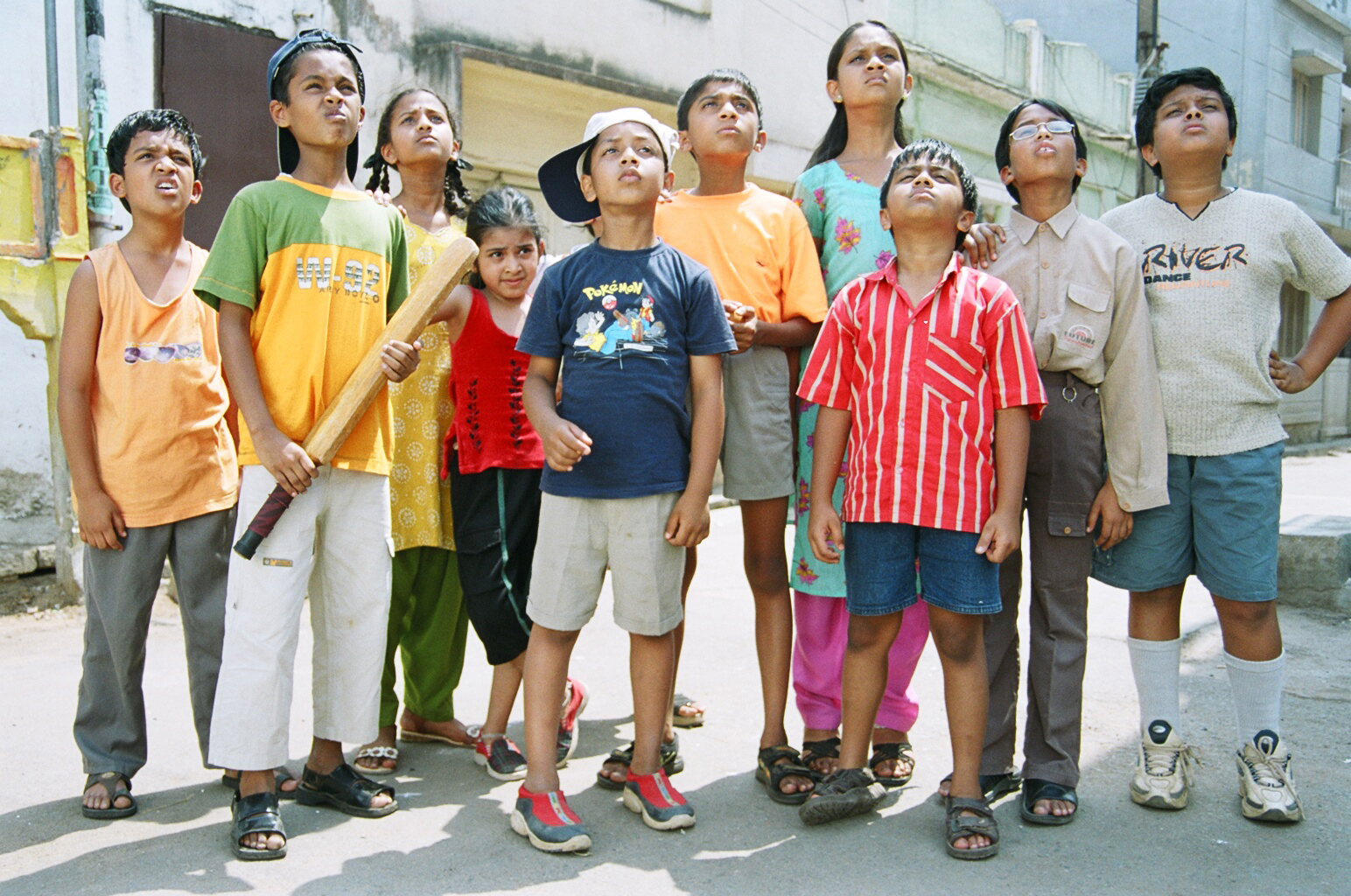
Broken glasses, obstruction to traffic etc leads parents to `advise’ children not to play in the streets. They go out in search of a place to play. They find a vacant land full of stones & thorns. They plead with the owner of that land – a well-meaning lonely old man left to himself with a lot of riches and also a lot of health complaints. They get his permission to play there. Old man is quite impressed with the way children were clearing up the whole place. He becomes one with them in creating a beautiful playground there with novel ideas drawn from David Werner’s famous book on creative use of readily available things around. He proclaims that the playground henceforth belongs to them. Mingling closely with children helps him regain his zest for life. In their company he finds a new meaning to his life. He starts spending more and more time playing and roaming around joyfully with children. His health starts improving.
Old man’s only son (Hari), settled in America, is not happy with his father’s association with `street children’ as he calls them. He arrives on the scene with his little son (Abhi). Abhi is quite attached to old man. Old man introduces Abhi to the `street children’. Abhi derives great joy playing with them, unmindful of Hari’s objections. Hari’s admonition of Abhi embarrasses and hurts Old man. To `retrieve’ Abhi and Old man from `street children’, Hari virtually `orders’ old man to pack-up and go with him to America immediately, much against his wishes. Hari’s rudeness puts Old man in a state of shock. He loses his speech and becomes bed-ridden. Hari cleverly uses this opportunity to keep the children away from Abhi and Old man. He now starts to sell that land. Abhi speaks to his mother in America and complains against father. Hari is unmoved by children’s pleadings & parents request and, arranges for demolition of playground to build a commercial complex. Unable to see their fruits of labor (playground) going out of their hands, children obstruct demolition. Children & parents are taken to police station. Embarrassed parents punish their children and order them to remain indoors.
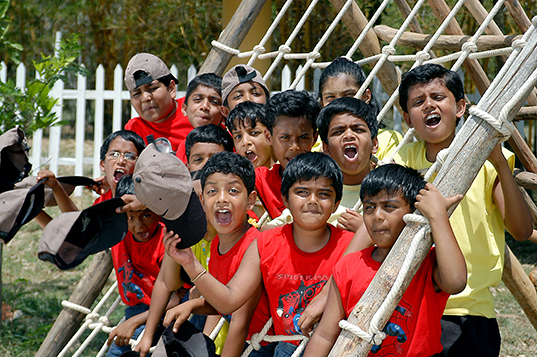
Meanwhile, children manage to meet the Old man, now in a wheel chair after a bit of recovery. They narrate the incidents and seek his help in regaining playground. In a great effort to pronounce his disapproval of Hari’s actions, he regains his speech. He is taken to the demolished playground. Under his supervision, children start rebuilding their playground.
Hari comes there searching for Abhi. To avoid any further problems, Old man tells the children that he would immediately register the land as a gift to them. By now Hari has realised his mistake prompted by the events and wife’s warning. He pleads for excuse and endorses the gift. Parents also rush there and hug their children. There is a sigh of relief.
The film ends with the Old man appealing to all parents for dealing with children the right way and grooming them for their all round development providing space for both studies and play.
My first three films were made as co-operative ventures by a team of actors & technicians including me, contributing both their skills 7 finances. Considering their success, I was planning for the fourth one on similar lines. I was at that time Ms. Jayamala asked me if I could come up with a children’s film to be produced by her. As a first reaction, I casually mentioned the story line of Thutturi, which my friends and I were working on for over eight years. She grabbed it instantly. Here I am with Thutturi, working for a single producer (outside cooperative venture) for the first time.
This subject which was churning in my mind for eight years has become a reality now. Looking back, I see the problem raised in the subject then has remained even to-day. In fact it has assumed greater relevance today because of indiscriminate growth of cities unmindful of the needs of playgrounds for children.
The film is about the pathetic conditions in which our poor and middle class children are placed as far as their need for playing is concerned. It also presents how some of those children rise to the occasion to meet their need in a big way, with their own efforts.
To go as close to children as possible, I have liberally used songs and games- particularly the good-old village games, which could trigger nostalgic memories of elders also. I have tried to fill maximum number of frames with 12 to 15 children to highlight the collective need of all children. We have selected these kids after a stringent selection process, which involved over 1000 students drawn from different schools. Most of the selected ones are first timers in films.
I am sure children will appreciate it because it is the projection of their need. I will be happy if it can capture the attention of others concerned – Government, public and parents in particular.
Direction – P.SHESHADRI
Story – J.M.PRAHLAD
Screenplay – P.SHESHADRI
Dialogues – J.M.PRAHLAD
Cinematographer – H.M.RAMACHANDRA
Editor – B.S.KEMPARAJ
Music – HAMSALEKHA
Art – SHASHIDHAR ADAPA
Costumes – ANUPAMA SHESHADRI
Tata – H.G.DATTATREYA
Harinarayan – DHARMA
Sridhar – SUCHENDRAPRASAD
Ajji – SHANTHAMMA
Bharati – REKHA
Shivalinga – MASTER. KARTIK SHARMA
Abhin – MASTER KISHAN
Sachin – MASTER ANIRUDHA
Balsi – MASTER PRATHAMA
Arun – MASTER NANDAN
Dadiya – MASTER SRIHARI
Mangala – BABY ANNAPURNA
Raksha – BABY NAMRATHA
Sridevi – BABY BINDU